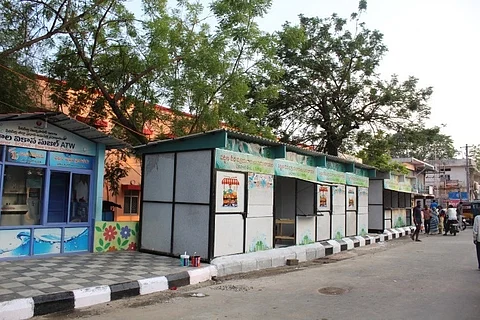

Telangana’s Sircilla district has become the first municipal body in the country to build eco-friendly kiosks for street vendors using recycled plastic. As part of the Urban Street Vendors Project, which aims at providing a supportive environment for vendors to earn a livelihood, TRS working president and Sircilla MLA KT Rama Rao inaugurated the facility on Tuesday morning.
The project is aimed at creating a sustainable model of development in the state and also to develop a conducive environment for the street vendors, who are often considered a major inconvenience on the already congested footpaths in Indian cities.
By building 55 kiosks in different places around the Sircilla district, the urban body has given a second lease of life to plastic waste, which is often thrown away at homes as non-biodegradable waste, a statement said. Each kiosk is of 8x8 ft size and around 400 kg of plastic waste has been used to build a single kiosk.
Speaking to TNM, Prashanth Lingam, head of Bamboo House India, the company which undertook the project, says that kiosks were built in a span of three months and they have been commissioned to build another 43 kiosks in Siddipet, another district in Telangana, by the civic body.
“This facility at Sircilla is an attempt by the Telangana government at providing permanent kiosks to vendors to transact their daily business. The vendors operating on the roadsides are often considered a nuisance and seasonal changes often make them run around the city with their pushcarts. Keeping this in mind, we have built kiosks using only plastic waste, on several footpaths in the city, providing a permanent solution to their crisis,” Prashanth says.
Bamboo House India is a company that is finding solutions to develop infrastructure that is eco-friendly. After mastering the trade of building and crafting utilities out of bamboo, Prashanth built his first plastic house in Kukatpally in Hyderabad and then a room for the metro staff at Miyapur.
“We required around 9,900 kg of plastic for the walling and roofing each and 13,200 kg for the flooring. In total, 33,000 kg of plastic was used to build the 55 kiosks. All the materials used for construction has been made using LDPE plastic. LDPE is low density polyethylene plastic, the simplest example for which is the milk packets which we throw away every morning,” explains Prashanth.
Though plastic infrastructure can be called an emerging sustainable model of development, the cost to build plastic houses are much more than the ones made of brick and mortar.
The average cost of building a single kiosk has been estimated at roughly over Rs 1 lakh. They have been provided free of cost to the vendors, without any rent. While the durability of the plastic houses is debatable, the high prices at segregating and recycling the plastic waste are a major deterrent in adopting this model.
“We have now got a couple of calls from different municipalities to build similar kiosks. It’s difficult to undertake projects at a larger scale because of the soaring prices. We are now looking at collaborating with the UNDP in India to make the project more viable for different districts in Telangana,” Prashanth adds.